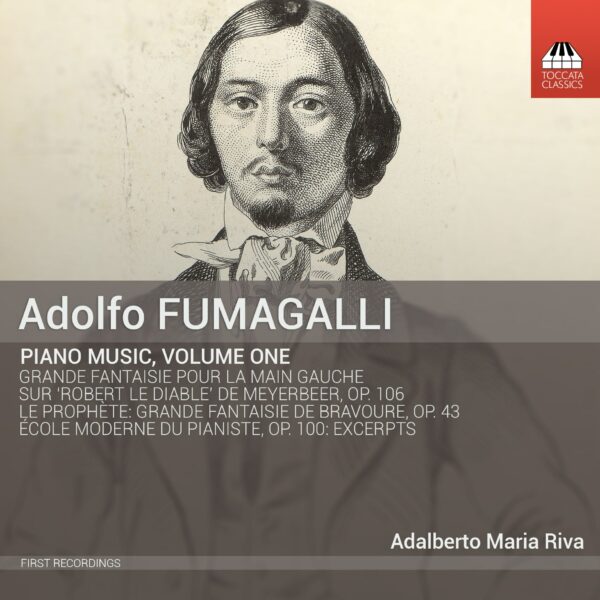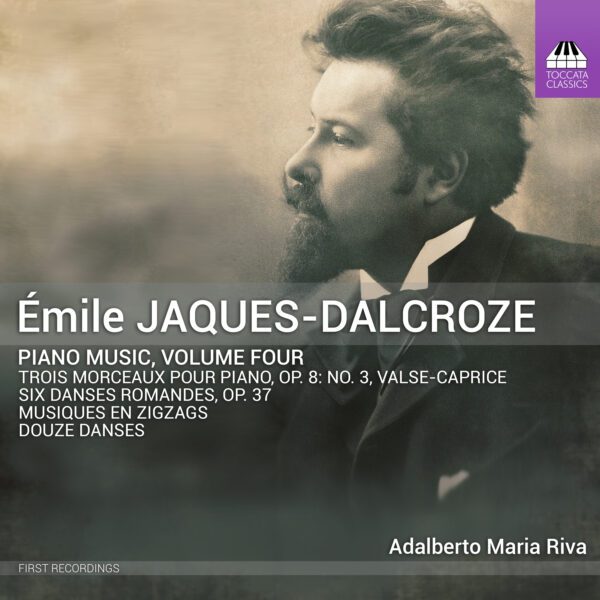Adolfo Fumagalli: Piano Music, Volume One
In his brief life Adolfo Fumagalli (1828–56), one of four musician brothers from Inzago, near Milan, made a name for himself across Europe as ‘the Paganini of the piano’, astonishing audiences with his dazzling technique and acquiring an especial reputation for performances using his left hand alone. Fumagalli composed a large body of piano music – over 100 opus numbers – many of them operatic fantasies and virtuosic studies of the type presented in this anniversary recital, recorded in his home town.
Adalberto Maria Riva, piano
Listen To This Recording:
- L’Ecole moderne du pianiste, Op. 100: No. 7 Le cloitre: priere du matin
- L’Ecole moderne du pianiste, Op. 100: No. 10 Le reveil des ombres: danse fantastique
- Grande Fantaisie pour la main gauche sur ‘Robert le diable’ de Meyerbeer, Op. 106
- L’Ecole moderne du pianiste, Op. 100: No. 14 La fille de l’air: caprice de legerete
- L’Ecole moderne du pianiste, Op. 100: No. 17 La roche du diable: etude de bravoure
- Le prophete: Grande fantaisie de bravoure, Op. 43





The Observer :
‘Happy 10th birthday, Toccata Classics. The creation of indefatigable Martin Anderson, the label has so far released 240 CDs, representing the work of 152 sometimes overlooked, often interesting composers (54 of them living). This disc is a perfect example of its mission to promote neglected music. In his short life, Adolfo Fumagalli (1828-1856), known as the Paganini of the piano, was revered by Liszt for his dazzling technique and compositional skill. Adalberto Maria Riva makes a convincing advocate here, particularly in an extraordinary grande fantasie for left hand based on Meyerbeer’s Robert le diable. The laconic Fumagalli wrote or arranged several pieces for the left hand so, they say, he could hold a cigar with his right while performing.’
—Stephen Pritchard, The Observer, 20 September 2015
Fanfare :
“In his lifetime he was one of the most respected pianists, perhaps the most famous Italian pianist of the 19th century until the arrival of Busoni. … Liszt hailed him as “the greatest of pianists, because anyone who is able to negotiate the difficulties of transcribing an overture like that of [Berlioz’s] Cellini is without doubt an artist out of the ordinary.” Many others also esteemed him, both for his playing and his compositional artistry. … Rossini praised him especially for his cantabile playing; … Through his virtuosity, perhaps especially for his wickedly difficult solo left-hand compositions, in Belgium he gained the nickname “the Paganini of the piano.” … the programmatic studies of the École moderne du pianist, op. 100, are some of the composer’s finest. … Of the former works, it is difficult to say which of the two Meyerbeer-inspired compositions is the more impressive: the diabolically difficult left-handed Grand Fantasy, op. 106, with its complex counterpoint, its myriad of sounds and timbres, and its extreme virtuosity—the one hand does more in this piece than two do in others!—or the Grand Fantasy on Le prophète, op. 43, one of Fumagalli’s pièces de résistance, which was praised highly by none other than Meyerbeer himself. … The original compositions are even more interesting in their own ways. … the ones that were finished reveal a composer of both astonishing creativity and compositional command. … they are moreover programmatic works meant to stimulate the listener’s sense of awe and imagination. … Throughout this recital Riva proves himself the ideal interpreter of these works in both his demeanor and his virtuosity, the latter of which is, at times, astonishing; one can hardly imagine the works being played better than Riva does them here, whether technically or musically. … And if one doesn’t know his music, then one owes oneself the pleasure of getting to know it better.”
—Fanfare Magazine, March/April 2016
American Record Guide :
‘Bravo once again to Toccata for rescuing unknown composers and giving them a chance to speak to new audiences. […]
Italian pianist Riva has toured internationally and is a real jaw- dropping technician. I cannot imagine these pieces done any better, and he accomplishes his tasks with ease and sparkle. His ability to maintain a light touch in the face of a shower of rapid notes is most impressive. […]
The recording is up to current standard, and the notes excellent, as usual for this label.’
—Becker, American Record Guide